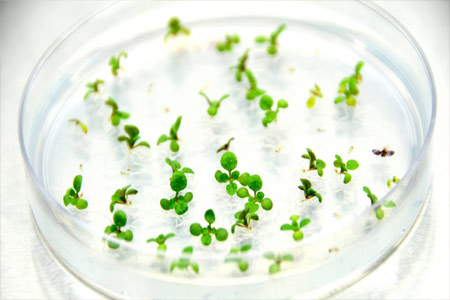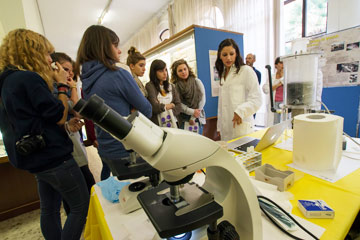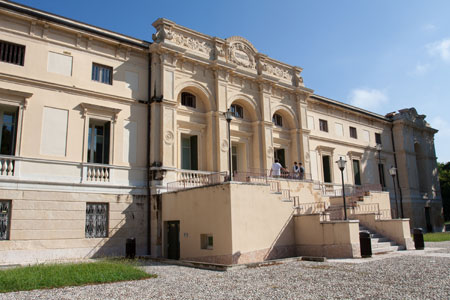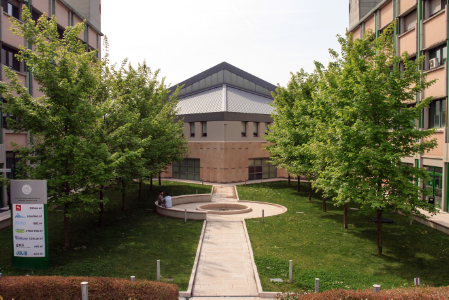|
Bachelor's degree in Biotechnology
Course partially running
|
Biochemistry of plants and others autothrophs (2025/2026)
|
6
|

|
5
|
(Teoria)
|
|
Master's degree in Agri-Food Biotechnology
|
Secondary metabolism and metabolic engineering (2025/2026)
|
6
|
|
6
|
|
|
Master's degree in Agri-Food Biotechnology
Course partially running
|
Synthetic biology of plant productivity (2025/2026)
|
6
|

|
4
|
(teoria)
|
|
Bachelor's degree in Biotechnology
Course partially running
|
Biochemistry of plants and others autothrophs (2024/2025)
|
6
|

|
5
|
(Teoria)
|
|
Master's degree in Agri-Food Biotechnology
Course partially running
|
Secondary metabolism and metabolic engineering (2024/2025)
|
6
|

|
6
|
|
|
Master's degree in Agri-Food Biotechnology
Course partially running
|
Synthetic biology of plant productivity (2024/2025)
|
6
|

|
4
|
(Teoria)
|
|
Bachelor's degree in Biotechnology
Course partially running
|
Cell Biology
(2023/2024)
|
12
|

|
3
|
BIOLOGIA GENERALE E CELLULARE: II [3° turno] (laboratorio)
|
|
Master's degree in Agri-Food Biotechnology
Course partially running
|
Secondary metabolism and metabolic engineering (2023/2024)
|
6
|

|
6
|
|
|
Master's degree in Agri-Food Biotechnology
Course partially running
|
Synthetic biology of plant productivity (2023/2024)
|
6
|

|
2
|
(Laboratorio)
|
|
2
|
(Teoria)
|
|
Bachelor's degree in Biotechnology
Course partially running
|
Cell Biology
(2022/2023)
|
12
|

|
3
|
BIOLOGIA GENERALE E CELLULARE: II [3° turno] (laboratorio)
|
|
Master's degree in Agri-Food Biotechnology
Course partially running
|
Crop productivity and stress physiology (2022/2023)
|
6
|

|
2
|
(teoria)
|
|
2
|
(laboratorio)
|
|
Master's degree in Agri-Food Biotechnology
Course partially running
|
Secondary metabolism and metabolic engineering (2022/2023)
|
6
|

|
6
|
|
|
Bachelor's degree in Biotechnology
Course partially running
|
Cell Biology
(2021/2022)
|
12
|

|
3
|
BIOLOGIA GENERALE E CELLULARE: II [3° turno] (laboratorio)
|
|
Master's degree in Agri-Food Biotechnology
Course partially running
|
Crop productivity and stress physiology (2021/2022)
|
6
|

|
2
|
(laboratorio)
|
|
2
|
(teoria)
|
|
Master's degree in Agri-Food Biotechnology
Course partially running
|
Secondary metabolism and metabolic engineering (2021/2022)
|
6
|

|
6
|
|
|
Bachelor's degree in Biotechnology
Course partially running
|
Cell Biology
(2020/2021)
|
12
|

|
3
|
BIOLOGIA GENERALE E CELLULARE: II [3° turno] (laboratorio)
|
|
Master's degree in Agri-Food Biotechnology
Course partially running
|
Crop productivity and stress physiology (2020/2021)
|
6
|

|
2
|
(laboratorio)
|
|
4
|
(teoria)
|
|
Master's degree in Agri-Food Biotechnology
Course partially running
|
Secondary metabolism and metabolic engineering (2020/2021)
|
6
|

|
6
|
|
|
Bachelor's degree in Biotechnology
Course partially running
|
Cell Biology
(2019/2020)
|
12
|

|
3
|
BIOLOGIA GENERALE E CELLULARE: II [3° turno] (laboratorio)
|
|
3
|
BIOLOGIA GENERALE E CELLULARE: II [4° turno] (laboratorio)
|
|
Master's degree in Agri-Food Biotechnology
Course partially running
|
Secondary metabolism and metabolic engineering (2019/2020)
|
6
|

|
6
|
|
|
Bachelor's degree in Biotechnology
Course partially running
|
Cell Biology
(2018/2019)
|
12
|

|
3
|
BIOLOGIA GENERALE E CELLULARE: II [laboratorio 4° turno] (laboratorio)
|
|
3
|
BIOLOGIA GENERALE E CELLULARE: II [laboratorio 3° turno] (laboratorio)
|
|
Master's degree in Agri-Food Biotechnology
Course partially running
|
Secondary metabolism and metabolic engineering (2018/2019)
|
6
|

|
6
|
|
|
Bachelor's degree in Biotechnology
Course partially running
|
Cell Biology
(2017/2018)
|
12
|

|
3
|
BIOLOGIA GENERALE E CELLULARE: II [4° turno] (laboratorio)
|
|
3
|
BIOLOGIA GENERALE E CELLULARE: II [3° turno] (laboratorio)
|
|
Master's degree in Agri-Food Biotechnology
Course partially running
|
Secondary metabolism and metabolic engineering (2017/2018)
|
6
|

|
6
|
|
|
Bachelor's degree in Biotechnology
Course partially running
|
Cell Biology
(2016/2017)
|
12
|

|
3
|
BIOLOGIA GENERALE E CELLULARE: II [4° turno] (laboratorio)
|
|
3
|
BIOLOGIA GENERALE E CELLULARE: II [3° turno] (laboratorio)
|
|
Master's degree in Agri-Food Biotechnology
Course partially running
|
Secondary metabolism and metabolic engineering (2016/2017)
|
6
|

|
6
|
|
|
Bachelor's degree in Biotechnology
Course partially running
|
Cell Biology
(2015/2016)
|
12
|
|
3
|
BIOLOGIA GENERALE E CELLULARE: II [3° turno] (laboratorio)
|
|
3
|
BIOLOGIA GENERALE E CELLULARE: II [4° turno] (laboratorio)
|
|
Master's degree in Agri-Food Biotechnology
Course partially running
|
Secondary metabolism and metabolic engineering (2015/2016)
|
6
|
|
6
|
|
|
Bachelor's degree in Biotechnology
Course partially running
|
Cell Biology
(2014/2015)
|
12
|
|
3
|
BIOLOGIA GENERALE E CELLULARE: II [3° turno] (laboratorio)
|
|
3
|
BIOLOGIA GENERALE E CELLULARE: II [4° turno] (laboratorio)
|
|
Master's degree in Agri-Food Biotechnology
Course partially running
|
Secondary metabolism and metabolic engineering (2014/2015)
|
6
|
|
6
|
|
|
Bachelor's degree in Biotechnology
Course partially running
|
Cell Biology
(2013/2014)
|
12
|
|
3
|
BIOLOGIA GENERALE E CELLULARE: II [3° turno] (Laboratorio)
|
|
3
|
BIOLOGIA GENERALE E CELLULARE: II [4° turno] (Laboratorio)
|
|
Master's degree in Agri-Food Biotechnology
Course partially running
|
Secondary metabolism and metabolic engineering (2013/2014)
|
6
|
|
6
|
|
|
Bachelor's degree in Biotechnology
Course partially running
|
Cell Biology
(2012/2013)
|
12
|
|
3
|
BIOLOGIA GENERALE E CELLULARE: II [3° turno] (Laboratorio)
|
|
3
|
BIOLOGIA GENERALE E CELLULARE: II [5° turno] (Laboratorio)
|
|
3
|
BIOLOGIA GENERALE E CELLULARE: II [4° turno] (Laboratorio)
|
|
Master's degree in Agri-Food Biotechnology
Course partially running
|
Secondary metabolism and metabolic engineering (2012/2013)
|
6
|
|
6
|
|
|
Bachelor's degree in Biotechnology
Course partially running
|
Cell Biology
(2011/2012)
|
12
|
|
3
|
BIOLOGIA GENERALE E CELLULARE: II [4° turno] (Laboratorio)
|
|
3
|
BIOLOGIA GENERALE E CELLULARE: II [5° turno] (Laboratorio)
|
|
3
|
BIOLOGIA GENERALE E CELLULARE: II [3° turno] (Laboratorio)
|
|
Master's degree in Agri-Food Biotechnology
Course partially running
|
Secondary metabolism and metabolic engineering (2011/2012)
|
6
|
|
6
|
|
|
Master's degree in Agri-Food Biotechnology
Course partially running
|
Secondary metabolism and metabolic engineering (2010/2011)
|
6
|
|
6
|
|
|
Master's degree in Agri-Food Biotechnology
Course partially running
|
Secondary metabolism and metabolic engineering (2009/2010)
|
6
|
|
6
|
|
|
Bachelor in Agroindustrial Biotechnology (until 2008-2009 academic year)
Course Not running, not visible
|
Plant Physiology and Biochemistry (2008/2009)
|
9
|
|
4
|
Biochimica vegetale
|
|
Bachelor in Agroindustrial Biotechnology (until 2008-2009 academic year)
Course Not running, not visible
|
Plant Physiology and Biochemistry (2007/2008)
|
9
|
|
4
|
Biochimica vegetale
|
|
Bachelor in Agroindustrial Biotechnology (until 2008-2009 academic year)
Course Not running, not visible
|
Plant Physiology and Biochemistry (2006/2007)
|
9
|
|
4
|
Biochimica vegetale
|








 dallosto
dallosto univr
univr

